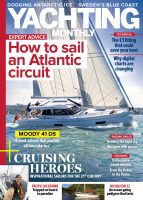Most in-depth analysis yet of marine leisure vessel's propulsion systems finds that using biofuels in traditional engines is greener than electric propulsion systems for many vessels
Opting for electric propulsion in a new yacht or converting a used boat to electric propulsion will be worse for than the environment than sticking with a fossil fuel internal combustion engine (ICE), according to a report published by ICOMIA (International Council of Marine Industry Associations).
The study is intended to provide regulators, governments and business with robust data against which to make environmental decisions about leisure vessels’ propulsion systems.

Presenting the report at the Marine Equipment Trade Show (METS) Amsterdam in November 2023, ICOMIA president Darren Vaux said, ‘For the first time, we’ve united the global recreational marine industry around our most comprehensive, peer-reviewed research to explore opportunities that could reduce recreational boats’ carbon emissions, giving us the data we need to begin educating policy makers, our stakeholder community, and boaters on the varied decarbonisation solutions unique to our industry. This new research provides guidance on the focus for the innovations we can begin exploring today to create a better boating experience that reduces our environmental footprint.’

Vaux outlined how the research suggests that the rush to ‘go green’ has been done amid a vacuum of data, and that the presumption for one system or another can only be flawed in this context. For example, the data shows that for sailing yachts, as well as for other vessel types, opting for electric motors and batteries will have a higher environmental impact over the vessel’s lifecycle than sticking with a diesel internal combustion engine.
For most vessels, the best way of reducing environmental impact is to remain with conventional internal combustion engines, but switch to using sustainable synthetic or biofuels such a hydro-treated vegetal oil (HVO) or e-petrol, the report claimed.
Doing this in a sailing yacht will, over the vessel’s 45-year lifespan with an average annual usage of 24 hours (under engine), reduce the vessel’s global warming potential by around 35%, compared to using fossil fuels in an ICE engine, where switching to electric or hybrid propulsion will in fact increase the vessel’s global warming potential by over 35% due to higher environmental impacts in the yacht’s and systems’ manufacture.
Of the nine vessel types analysed, electrification was only the greenest option for a commercially operated personal water craft used for 156 hours per year over a 12.5 year lifespan. The highest impact of going electric was for a displacement motorboat, used for 48 hours a year over 45 years, where the global warming potential went up by over 80%.
The study also noted that due to the relative energy density of electric or hydrogen storage, it was unrealistic to compare vessels capable of equivalent ranges or performance. For example, a small powerboat capable may be capable of 166 miles over 14 hours (typical duty cycle) from either fossil fuel or sustainable fuels. If converted to pure electric propulsion, it would require 360% more energy storage by volume and 820% more by weight to achieve the same range, giving the vessel a displacement a prohibitive 133% greater.
For hydrogen, the storage would be 430% larger by volume and 350% more by weight. As a compromise to allow the vessel to retain its performance and usability, energy storage was scaled back to 61% more by volume and 13% more by weight for hydrogen, and 61% larger and 13% heavier for electric, increasing its displacement by just 6% and 16% respectively. The impact on range was a duty cycle of 3 hours and 35 miles, reflecting an 80% reduction in range. It was against systems of this scale that the life cycle assessment comparisons were made.

The report found that cost was also a significant factor, with all alternatives being more expensive than the status quo, with electric systems being 40% to 250% more expensive, 85% to 200% more for hydrogen, 25% to 115% more for hybrid, but 5% to 45% more for sustainable drop-in marine fuel alternatives.
The research concluded that renewable diesel fuel, specifically hydro-treated vegetable oil (HVO) ICEs can provide the largest global warming potential (GWP) reductions for diesel craft, but only if the fuel is produced using waste feedstocks so that it is not taking resource away from global food production, giving the marine industry the greatest chance of decarbonising by as much as 90% by 2035 without compromising a vessel’s range or performance.
It also concludes that because electric-only systems ‘may have a higher GHG (green house gas) contribution from raw materials and manufacturing than conventional propulsion systems, vessels that have low-usage cases are unlikely to ‘yield a reduction in green house gases’ over their lifespans. Boats that are in frequent and prologued use may be more likely to reach the break-even point, while hydrogen and hybrid systems, may in some cases be the greenest option.
Article continues below…
Teak wood: why the popular wood’s time is up
Choosing the most sustainable options for your boat can leave you feeling confused, but don’t worry, you’re in good company.…
Electric yacht: What are the options for going electric?
Electric and hybrid yachts are growing in popularity; we outline the current options for those making the switch
The report’s authors were keen to emphasise that the report was not aiming to stymy innovation in any systems or technologies, but rather to identify the real-world use cases in which these systems are the best to choose, and to highlight where more development and investment is required. Its authors also acknowledged that choices may be made in favour of one system or another for desirable local reasons, such as pollution or noise reduction within sensitive ecosystems.
While the report noted that the majority of a sailing yacht’s environmental impact is in its manufacture rather than use, it was only looking at propulsion systems, and not at ways of reducing global warming potential from the manufacturing process and supply chains of the boat itself. It also noted that case by case, some vessels, locations, use cases, manufacturers and supply chains would not fit into the broad brushstrokes of their findings and would have solutions that were significantly more environmentally friendly than the average.
In its report Pathways to Propulsion Decarbonisation for the Recreational Marine Industry, ICOMIA set out to create a robust analysis of the full environmental impact of all currently available propulsion technologies for recreational vessels under 24m. ICOMIA noticed that while everyone in the recreational boating sector is eager to reduce their carbon footprint, there was a lack of data that looked at the problem holistically, considering the full-life ‘cradle-to-grave’ impact of building, using and disposing of leisure craft. They also noted that national and international regulatory and policy decisions are being made in the absence of robust data, leaving potential for flawed choices and the potential dismissal of the best options for reducing the marine industry’s carbon footprint.

The study covered boats from inflatable tenders with small outboards and personal watercraft up to large planing and displacement motor yachts (up to 24m), as well as sailing yachts, inland waterways craft, small powerboats, fishing boats and pontoon boats (a large sector in the US).
The five power systems weighed up include conventional petrol or diesel ICE engines as a baseline, with sustainable fuels (such as HVO or E-petrol) for ICE engines as drop-in alternatives for fossil fuels, hybrid fossil fuel/electric systems, battery electric drives and hydrogen ICE engines or fuel cells.
The study was undertaken in six distinct steps, which included: exploring the decarbonisation options; conducting a Greenhouse Gas Life Cycle Assessment (LCA) to ISO 14044 and 14067 standards including the manufacture, use phase and end of life for energy converters and energy carriers; assessing the total cost of ownership of each system, including purchase, operation and maintenance; analysing the implications of life expectancy, maintenance, performance, safety and availability of each system; analysing the infrastructure implications, before ranking the suitability for each craft type and usage case.
The report begins by outlining the difficulties of finding a ‘one size fits all’ solution to decarbonisation for leisure marine vessels due to the vast array of craft, environments and usage. It notes that will 80% of a car’s environmental impact is in its usage (the rest being in its manufacture and delivery), a far higher proportion of a boat’s environmental impact comes from its manufacture – as high as 50%.
This is in part due to that fact that leisure vessels are used for a relatively tiny number of hours annually. Figures suggest that sailing yachts’ propulsion systems are used on average for jut 24 hours a year, while the boats have an average lifespan of 45 years. The environmental impact of electric propulsion increases dramatically when batteries need to be replaced.
The decision to commission the research from engineering and sustainability consultancy Ricardo came against the backdrop of pressure being exerted on businesses across the marine industry by the targets set in the Paris Agreement, a legally binding international treaty that seeks to limit global temperature increase to 1.5°C above pre-industrial levels.
This is leading governments and regulatory bodies to take steps to delivery this across every sector of the economy, including the maritime sector, and the leisure marine industry within that. ICOMIA wanted to be able to work with regulators to reach decisions based on data rather than emotions, assumptions or ideologies.
An executive summary of the report can be downloaded here.
Enjoyed reading this?
A subscription to Yachting Monthly magazine costs around 40% less than the cover price.
Print and digital editions are available through Magazines Direct – where you can also find the latest deals.
YM is packed with information to help you get the most from your time on the water.
-
-
- Take your seamanship to the next level with tips, advice and skills from our experts
- Impartial in-depth reviews of the latest yachts and equipment
- Cruising guides to help you reach those dream destinations
-
Follow us on Facebook, Twitter and Instagram.






